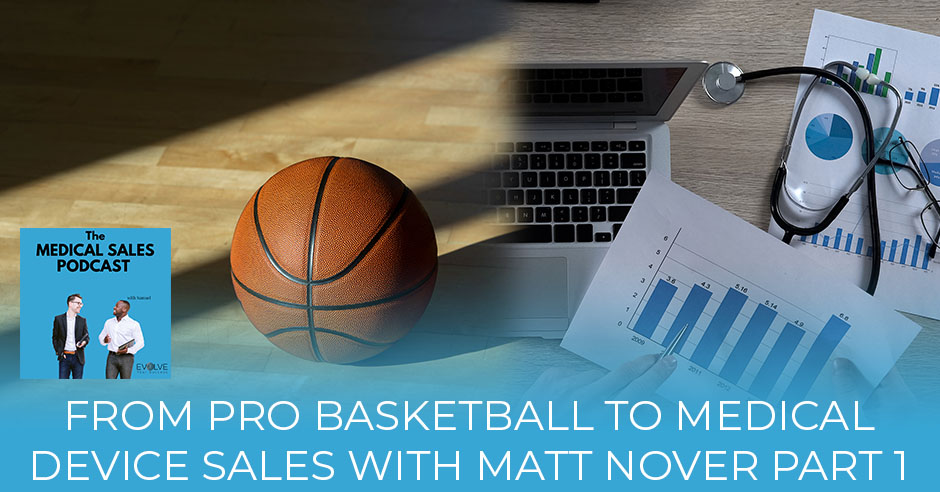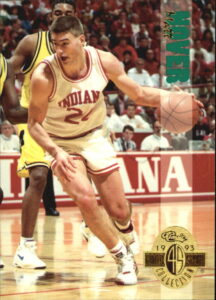
It’s a common theme for people with a background in sports to use what they have learned from the game when they get into post-athletic careers. The same can be said for those who went into medical device sales. But it’s not as easy as it seems. For Matt Nover, years in professional basketball have somewhat prevented him from building the necessary experience to stand out in his chosen field. He had to take the skills that he had learned from being an athlete and translate them into the world of work, sales, and leadership. His hard work paid off and he is now the Clinical Sales Director at TELA Bio, a medical device company that specializes in soft tissue reconstruction. Kicking off this two-part conversation with Samuel Gbadebo, Matt explains how he went from a professional basketball career to becoming a leader in the medical sales field. He also talks about the skills that he has learned since he took on that role, as well as his passion for teaching others the ropes of medical device sales.
—
Watch the episode here
Listen to the podcast here
From Pro Basketball To Medical Device Sales With Matt Nover Part 1
We have with us Matt Nover. He is the Director of Clinical Sales at TELA Bio. One interesting thing about Matt’s career is he was a pro basketball player who toured the world and played in some big leagues before becoming the Director of Clinical Sales and even entering the medical sales space. It’s going to be a great episode because we’re going to talk about his position, but also what brought him from that career to this career and all the amazing things he is doing. As always, thank you for reading. I do hope you enjoy this episode.
—
Matt, how are you doing?
Good, Samuel. How are you?
I’m fantastic. I’m glad you can join us here on the show.
I’m glad to be here.
Normally, I say a little blurb about you, Matt. You got this fascinating story. I’m going to let you kick it off. Matt, who are you and what do you do?
I’m Matt Nover. I’m a husband and a father, first and foremost, Samuel. We talked about that and got to know each other here during our process of connecting. I’m a husband to my wife, Claudia. She is from the wonderful country of Portugal, where I met her during my professional basketball career. We have a son, Vincent, our one and only. We’ve done quite a bit of traveling. I started off my career as a professional basketball player after finishing at Indiana University. Since then, I’ve gone through an interesting pathway that’s led me into medical device sales. I’m the Director of Clinical Sales Development at a soft tissue reconstruction company called TELA Bio.
Before we even get into the history of how you got there, for those in the audience that might not know exactly what that is, what exactly is that? What is it that you’re doing each and every day?
[bctt tweet=”There are a lot of parallels between sports and business. You have to shine individually but you also have to develop within a team.” username=””]
Soft tissue recon is mostly for abdominal wall and hernia applications, as well as plastic surgery. Plastic surgeons do a lot of reconstruction. We focus on the abdominal wall hernia space. We work with general surgeons, colorectal surgeons, trauma surgeons. We’re doing larger abdominal reconstructions after trauma, cardiothoracic surgeons that deal with hernias in the hiatus around the esophagus, in the diaphragm. We work with cardiothoracic surgeons who do chest wall reconstruction. They’re reconstructing the diaphragm and the soft tissue muscles around the rib cage, and the chest cavity that holds the lungs.
Being the Director of Clinical Sales, you go out into the field and spend time with representatives to train or not as much?
Yes, definitely. When there are opportunities to get in the field for regional meetings when things are opening up. It’s been very remote, as everybody knows. We’ve been doing this all virtually. We’ve done a great job with our company in developing virtual programs that we can do through Zoom calls like this. We’ve done a lot of training through this but yes, I get out in the field in this director position. I work with reps one-on-one when needed. I work with them in groups. We do various things like labs. We do conferences. There’s some travel involved.
Were your reps able to work remotely with their providers over the quarantine time?
Yes, we work.
Talk to me about that.
It hit in March of 2020. Everything was locked down. It came to emergency procedures only as you know. Elective cases were completely locked down unless they were life-threatening situations. For us, a lot of the hernia procedures and abdominal wall reconstructions got postponed and canceled. They weren’t happening. Everything that concerned us was in trauma. We still wanted to stay in touch with surgeons. We still needed to figure out how to share our story, share our product, share what we do and our solution for patient care. We would reach out virtually through emails, all sorts of programs, using video, sending maybe videos, texting, relationships, any way that we could get in front of surgeons. We started developing programs. We had a VIP program where we would bring interested surgeons who want to learn more about our company and our solution to our headquarters outside of Philadelphia. We couldn’t do that during COVID in 2020, so we started offering virtual VIPs.
Virtual VIPs, which are called Lives, are tele-live programs that are virtual. Now, it’s becoming in-person so they can fly out to a live engagement in Philadelphia. We would do them where we had our entire leadership team, including the sales representative that engaged the surgeon or the customer, and then all of our leaders, our CMO, our CEO, our vice president of sales, whoever was needed. Our lead engineer would get on this call and we would have a team on live that would engage with the surgeon or surgeons. We present the product, answer any questions and see if there was a need that we could fulfill. We ran some interesting numbers and saw quite a bit of ROI. They were very effective in that culture built.

In the beginning and underneath, the base of everything that we do is that we’re all human beings. When you make a relationship connection and a personal connection to say, “These people are sincere. They’re full of integrity. They’re doing things for the right reasons. They are concerned about what I’m doing as a surgeon, my patients from my practice.” We make that connection and we were worried. Everybody was. We didn’t know that would even work because people were running from these platforms, but it worked well for us so far.
As we’re coming out or we’re getting back to normal, do you feel with your business that things can go right back to the way they were? Do you feel that things have been permanently changed and you still have to find new ways to get access and do what you want to do professionally?
They’ve changed forever. They’ll never be the same as they were. If you even go maybe a few years back to the point of things changing, there was not that traditional engagement with the surgeon in a medical device. They want the product. It’s going to be used in the next case. As you know, with the process, we’re getting much more complicated supply chains, hospitals and purchasing groups. We’re making that interaction for sales reps and for the industry more difficult to get in front of customers and surgeons to offer a unique solution with new products and innovation. It was becoming complicated. COVID stepped it up another level. We did these lots of supply chain people as well. Those are our customers as well, the hospital administrators. We would engage them.
This has changed forever. Almost what they realized in 2020 is if we can do this all virtually, why do you need to come into your regular appointment? If you’re good at your virtual engagement with the market, what is a sales rep going to do? In the end, it’s the human touch. You’re always going to need personal face-to-face interaction. It’s always going to be needed. You can go completely virtual. We’re not AI. We’re not robotic. That’s all coming too. Much of this healthcare is going to be remote, but there’s still going to be a need for human connection and touch and face-to-face. It has changed forever but if you can work that hybrid of virtual interaction using more video, reaching out to people, and using less of their time, not flooding them. Because of what we are faced with, time is so much more money because we’re distracted by many different things that are pulling our attention.
With the hybrid model, there is no other way to go. Companies that can figure out how to maximize that hybrid model and still keep their customers engaged, they’re going to be fine. That’s good. Let’s walk it back a little bit. I want to get back into how you got to where you are. You have an interesting history that people have to know about, Matt. Let’s take us back to college. What were you doing in college?
I was part of the Indiana University basketball team. I got recruited out of high school to play at Indiana for Coach Bob Knight. We had great teams back in the late ’80s, early ’90s. If anyone’s a big basketball fan out there, they’re familiar with it. I was on the team with Calbert Cheaney, Greg Graham, Damon Bailey, Alan Henderson, some big basketball names in the Midwest that went on and have NBA careers. We had a great team. We went to the final four. We lost to Duke in the final four in the semi-finals in 1992. We played against Shaquille O’Neal’s LSU Team back in ’92 as well. It was my last college game. I’ll take credit for guarding him for most of the game. He’s a big man.
What was that like?
That was great. There were many great players back in those days in the Big Ten alone, names like Acie Earl, Michael Polsky out of Michigan State, Jamal Mashburn out of Kentucky, so many powerhouse players. At the Fab Five out of Michigan, Juwan Howard, Chris Webber, Jalen Rose, we played against those guys. It was a great era of basketball. Here’s an interesting note. Our graduating class of Calbert Cheaney, Greg Graham, Chris Reynolds and myself in 1993 have the most wins for graduating class of any class in basketball history. That’s cool. Players don’t last for four years. They’re always in and out pretty quick in the college game. If they’re good enough to get to the NBA, they’ll jump. That record is going to stay. A player like Calbert Cheaney probably never stays for four years.
[bctt tweet=”The better you know your competition, the more you’re going to learn.” username=””]
You were recruited. You were in Indiana. You set up all these grades, then what?
I went to the Kelley School of Business at IU. I got a Marketing and Management Degree in Business School. From there, I had a little jump. I wanted to launch my basketball career. I had a little platform of a different arena. It was in a movie. Have you seen Blue Chips?
Yes, I’ve seen Blue Chips.
Do you remember the character from the farm from French Lick?
I didn’t know.
I hold that one back because I want to throw you for a loop. I didn’t tell you about that much.
You got your business degree and then you went into the movies a little bit?
No. It was just a one-time thing. The directors and the producers of White Men Can’t Jump and Bull Durham were making this movie. They came to Indiana for two weeks because they wanted to build the characters based on Bobby Knight’s personality and character background. The movie is based on a fictitious coach in a school in UCLA or Los Angeles, who has always been a straight arrow, always followed all the rules, never cheated. He knows that in college basketball, it’s been forever a controversy with paying players, kids not going to school and what have you. This coach is faced with that dilemma. He’s losing his players to other schools that are giving them gifts, money, cars or whatever it might be. He has to make a decision in the movie. That character was played by Nick Nolte. He plays the Bob Knight personality.

They were in IU for two weeks during my senior season. They followed us around. They did a lot of filming, a lot of studying the character. In the end, what turned out is they invited us all to be in the movie but beyond that, they invited me for this major part, to be one of the three main recruits that Nick Nolte recruits in the movie. It was myself, Shaquille O’Neal, who played the other role, and Anfernee Hardaway from Memphis. That’s how it happened. It was the luck of the draw. I was in the right place at the right time. As soon as I graduated, we started filming out in LA, down in French Lick, Indiana and various places. At the same time, my major focused was trying to make the NBA and start a professional basketball career because I had that opportunity after my college career. I was filming the movie in the summer of ’93, as well as going to NBA summer camps, pre-draft camps and all that stuff.
You’re the farmer that was the cocky guy in the movie?
Yes, I have shorter hair back then and a lot younger.
You started thinking, “I’m going to get serious about my basketball career.” You started going to the camps. Walk us through. What led you to your first opportunity in your pro career?
I did the pre-draft camp. In sports, I was assigned to an agent. Once you’re eligible to play professionally and you don’t have any more eligibility academic venue in college, you can get an agent. The four of us that were graduating that year, Calbert and the rest of us, had agents. They look for the best situation for you. They’re like a medical device recruiter. They’re working with the teams and then they’re working with the talents to make a match. I took it pretty far in the NBA but it was very difficult. What worked out for me was overseas. My first job was playing professional basketball in Italy and that extended into a twelve-year international basketball career. I played seven years in Europe, and 3 or 4 in Asia in Japan.
We’re going to have a separate episode just to talk about your career as a pro player. I got to know much more. You had a good experience as a pro player. What happened when you said, “I’m going to do something different?”
Retirement always has to come at some point. You learn so much from it. There are a lot of parallels between sports and business. It’s like the behaviors and the personality traits. The way that you have to develop teamwork, the way you have to play well and work with others, the way that there’s leadership versus being part of a team, part of a group. You have to shine individually. You have to make sure that you’re developing individually, but you also have to develop within a team, within an organization. It’s the same in sports as it is in basketball. I learned so many great things. Based on that, that’s how I launched into another career, in transition from twelve years in sports, which is tough.
I talked to a lot of other former athletes. When you graduate from college, usually, your pathway is to go into the job market. You have to build a resume. You have to start doing interviews and find out and start a career. When you have a 5 to a 10 to a 15-year gap right when you graduated college to go into the job market, that’s tough because you haven’t built the resume. You haven’t built the experience necessary in any field. I had to translate what I learned in life experience. I didn’t have career experience. I had a sports career but I don’t have career experience or anything. That’s why I used to say, “Here’s what I did. Here’s how I was successful. Here are the skillsets that I’ve developed. Here are the leadership capabilities that I’ve worked on and developed. Here’s how I’ve helped others. Here’s how I think I can help you.”
[bctt tweet=”Knowledge is power but how you apply that knowledge is a superpower.” username=””]
The first thing before I met anybody at medical device sales, I opened up my own basketball school. For about a year, what made the most sense was to apply everything, my experience and what I have learned, training and developing myself as an athlete, and also coaching others in basketball and athletic development. I opened up a school. I did that for about a year in Indiana. During that time, I met the father of one of the high school kids that I was training. He was in medical devices orthopedics. I started a conversation, chatting with him about the industry and the world of med devices. I loved it. A lot of former athletes already knew about it and were in it. I thought it was very interesting. It was also competitive, but it was a chance where you’ve applied your skills in a similar way to have towards excellence and success. I noticed a lot of parallels. It interested me. I started interviewing. After a year of doing basketball, I got my first opportunity with a company called the Right Medical in Chicago.
Even being a coach, having your own program to train other talents in basketball, who had been a talent in basketball and then having a pro career, that has been a strong talking point when you started at Right Medical.
Yes, but it was the ground floor for me because I had no experience. They wanted to work with me to develop and see if I could translate what I learned to the medical device arena, work with surgeons and be able to develop business in a different sense. I didn’t have any experience developing a business. The marketing management background helped me be able to strategize, plan, build, look at the territory, look at the customer targets and figure out a plan. I was very well organized. I could do that. I showed them that in interviews. I dove in to learn. I’m telling you. I always enjoyed being able to coach. I always enjoyed helping someone learn how to shoot a left-hand layup, for example, young athletes that couldn’t. When I tried to teach it, I had to break it down. You have to break down the mechanics of it. How do they get the ball from the hip to the extension? How do they lift that other knee when it’s so awkward for them? We broke it down into little steps.
I did the same thing in business. I broke it down into little steps. I also figured out what I had to develop. I was a sponge. I went to those that were successful. I worked well with my distributor and all my leaders at Right Medical to understand what success looks like. What is the pathway to getting there? What do I have to learn? It was a tough road. It’s difficult because you got to pick up clinical knowledge. You’ve got to develop your expertise clinically. You have to build a procedure. You have to know anatomy. All these things that you didn’t think mattered do matter. It was a continual learning process.
You went from Right Medical to Cook Medical, and then finally, Intuitive Surgical. Were those just you deciding you want more and something different or was there a unique reason for those two counts?
I don’t think anything too unique. You’re always looking at making connections. You’re always meeting people as you go along your pathway. This is so much about your personal development. You have to be self-aware. Self-awareness is a huge thing, no matter what we’re doing in life. In medical devices, it’s important to understand what is your purpose for being there? Why are you in the medical device? Are you there to make money? Do you understand that to be successful, there are all of these things that you need to do on a daily basis? Are you reading the journals? Do you understand anatomy? Do you understand who were all the major hernia surgeons, for example, for a hernia? Who are the key colorectal surgeons? Where do they play? What are their specialties? Who have they taught? Who have they trained? All this stuff is interconnected. Who are the competitors?
That’s how you move from one to the other. You start engaging with your competitors. Sometimes when we’re in a competing industry, even in sports, we don’t want to talk or get to know our competition. We keep them at bay. It’s almost like that old saying, “Keep your friends close but your enemies closer.” The better you know your competition, the more you’re going to learn about how maybe you have an advantage, and what you can learn from them. They can teach you a lot. Not only to develop yourself but in terms of advantage in the field and on the court when you’re competing.
From Intuitive, you got into TELA Bio and that’s when things took off for you. You were an account manager there and then you became a regional sales manager. Tell us about that. For those that are in roles right now and they’re thinking, “I want to get into leadership,” what would you advise them? What did you learn in your pathway to get into that position?
The titles will come based on how you carry yourself and what you’re doing. I’ve always thought of myself as someone that wants to serve others, wants to help and wants to get someone else better. To do that, you have to develop yourself first if I’m going to teach somebody else or I’m going to help somebody else succeed in the medical device arena. When I was with Cook Medical before I got to Intuitive, I was a mentor. I enjoyed mentoring. I enjoyed helping new reps along their pathway and on the onboarding process.

I was good technically from an early point. I was always part of the training. Every time we broke out in training, I led groups. I helped with anatomy training, procedure, cadaver labs, and all that stuff. It was a continual process. As you do that, as you like to teach, as you like to help others, and more importantly, as you like to learn, it’s learning and evolving your knowledge. Knowledge is power. That’s the first thing, but how you apply that knowledge is your superpower. When you can apply a superpower to applying the knowledge that you learn, that’s the thing that people take notice of.
Doing that success, positions, titles, advancement or however you want to say it, it is a result of what you’re doing daily in your current job. I was a representative for a long time but during that time, I was always developing leadership. I was always helping others and always showing that I can develop this team of people. We can get to another level together and here’s how we do it. All that led to this. Intuitive Surgical and Cook Medical were both big companies. It’s interesting what you’ll find in this space. It makes sense with what you were saying in terms of a pathway. For all of your readers out there, it’s hard to understand what that pathway looks like. If they don’t have any familiarity with it, then where do you start? Where does the transition happen? How do they happen? What are my opportunities for advancement? Cook Medical was a $4 billion or more privately held medical device company. They were not public.
That was unique because it was family-oriented. It felt like a small, tight-knit organization, which was great, but they were in over 40 countries around the globe, nine divisions, a big organization. That’s one culture that’s out there. When I went to Intuitive, what enticed me there was the technology. There’s a new innovation. There’s something unique in the market. It’s robotic surgery. Nobody else was doing it at that point. There were a few competitors trying to get on. They own the market for robotic surgery. That offered a unique differentiation to patients and for surgeons, so I love that idea. That’s what attracted me to go there.
That was a public company. That’s all about growth. You got to hit your numbers. This can be intimidating to anybody entering into our space, especially if you go with a bigger company like Medtronic that you’re familiar with, Johnson & Johnson. These big companies are growth companies. They’re on the stock market. They have shareholders. They need to keep showing numbers. You can get intimidated and focused on the number. What I noticed is I got to step back from it because that can hinder your development and hinder you from being excellent.
—
That was Matt Nover. It’s always interesting to hear someone that came from pro basketball and then went into the medical sales arena, and all the value he learned from that space to bring into medical sales. He talks about some of that in part one. Make sure you tune into what else he has to say with part two, where he goes deeper into his role and deeper into some of the things he brought from basketball into medical device sales. If you’re someone that’s reading this and you’re thinking, “I want to be in this space. I want to be in medical sales,” whether it’s pharma, med device or something else, then you need to visit us at EvolveYourSuccess.com. Select Attain A Position right from the homepage, get in touch with us and have a conversation with one of our client’s specialists or myself. Let’s have a conversation about getting you into the role you want to be in.
If you’re someone out there and you’re currently working for a company, you’re where you want to be but you want to develop, you want to get a promotion, you want to maximize your territory, or you’re trying to develop an online brand because you’re seeing the value of knowing what you’re doing on platforms like LinkedIn, then visit EvolveYourSuccess.com. Select Improve Sales Performance. Get some time with us and let’s have a conversation about how we can help you get to where you want to be. As always, we do our best to bring you guests that have real nuggets to share and some value to give your day into whatever you’re doing, whether you’re someone that wants to get into the industry, you’re in or you’re leaving the industry. Make sure you tune in for another episode of the show and read about Matt Nover in part two.
Important Links
About Matt Nover
 I am a mediocrity disruptor with over 20 years of top-performing success in both the established and startup medical device industries.
I am a mediocrity disruptor with over 20 years of top-performing success in both the established and startup medical device industries.
As a leader, I am fiercely committed to guide individuals towards the realization of their highest performance capacities and the production of masterful work which, ultimately, empowers them to meaningfully dominate and impact their field.
I am passionate about revolutionizing the future of the medical device industry and healthcare. It is an honor to help preeminent medical device organizations orchestrate their business from concept to market and beyond.
As a Regional Sales Manager for TELA Bio, I embraced an entrepreneurial approach and built and led a high performing sales team in driving our disruptive technology into various markets and in seizing revenue opportunities in uncharted territories.
In my new role as Director of Clinical Sales, I am impacting our entire organization with my leadership, coaching and untethered mindset. My mission is to lead the development of a patient-centric sales force. This will define a new paradigm of the “sales process” and engineer more of a “customer experience” that will help redefine the future of healthcare.
Love the show? Subscribe, rate, review, and share!



















































































